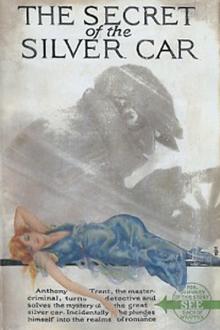The Secret of the Silver Car by Wyndham Martyn (best classic romance novels txt) 📕

- Author: Wyndham Martyn
- Performer: -
Book online «The Secret of the Silver Car by Wyndham Martyn (best classic romance novels txt) 📕». Author Wyndham Martyn
“It was in Paris where I was staying with my daughter. He said that at last he had a weapon which would wound me. Arthur had sold him the draft. He had it concealed where none could get it. Unless I retired from public life and activities he would show it to the same cabinet which had heard me swear I had destroyed it with my own handa. The inference would be that I had sold it. It was known that I had lost money through the failure of a London bank. No matter what the cabinet thought my honor was smirched and I should rightly be considered unfit for high office. There, Mr. Trent, is the real reason.”
“Do you know where the draft of the treaty is hidden?”
“In his almost inaccessible castle in Croatia.”
“You are certain?”
“Two men have died so that the knowledge might be mine.”
“I should imagine he would keep it in the deposit box of a bank where he could get at it quickly.”
“Banks can be broken into easier far than his strong room. He lives, despite the changes wrought by the war, in a style almost feudal. He owns and controls twenty square miles of the country where his home is. What chance, I ask you, has a stranger of getting near without incurring suspicion. There are many men who can speak German or French like natives but Hungarian is a different matter, a non-Aryan tongue.”
“It should be done from the inside,” Trent mused.
“One of them was,” the earl told him, “the man who tried was skillful, adroit and courageous. He had flirted with death a hundred times, just as you have done Mr. Trent, but they set a trap for him there which a fool would have passed by; a trap so skillfully baited that only a clever man would have tried to use it to further his cause. Yet he failed. You have no idea of the household at that fantastic castle in the mountains. You have no idea of the imperious temper and power of the man who owns it, the multitude of servitors who would kill did he but suggest it, the motley company he entertains there.”
This mention of many visitors interested Trent.
“He entertains a great deal then?”
“Only those he knows, men and women. The life there as reported to me reads like a chronicle of medieval days.”
“The other man who failed—what did he go as?”
“A steeple chase jockey. The count kept a great stud and raced all over Continental Europe. He owned Daliborka the great horse which won the Grand Prix.”
“The horse that was stolen?”
“Exactly. Daliborka and three other thoroughbreds were missing from the stables. The man who pretended to be a jockey and was instead a man of lineage and wealth secreted the horses at intervals along the forest road that runs from the castle to the coast. It was his idea when he had obtained the draft to make his way by relays to the nearest harbour. The poor fellows never had the opportunity to throw a leg across any of them. You see, Mr. Trent, there is no chance at all.”
“I will make one,” the American said confidently, “I am going to enjoy this.”
“After what I have said you still persist?”
“Because of it,” laughed Anthony Trent. He had forgotten everything but the prospect of coming danger, the duel that was to be fought between him and this fabulous magnate. It was characteristic of Trent that he swept aside all other possible inmates of the lonely castle as beneath his notice. His business was with the superior.
“How do you know he is still in London?” Trent demanded.
“I keep myself informed,” the earl said, “A newspaper clipping concern sends me every notice of him.”
“I want them,” the younger man observed, “I want everything that will help me.”
He read through the brief notices eagerly and wished English papers discussed personalities with the detail American periodicals employed. The only item that interested him deeply was a notice that Count Michael Temesvar had visited the automobile show at the Crystal Palace and seemed interested in the new twelve cylinder Lion car.
“Rather humorous in its way,” the earl said smiling, “since I own a great deal of stock in that company. That’s why I have that inordinately high powered car in the garage which you and Arthur seem to like.”
“Humorous!” Trent repeated, “I don’t know that it isn’t more humorous than you know. Do you think he has any idea you are interested in the company?”
“Few know it,” the earl said, “and I don’t see why he should when even my friends are ignorant.”
“How much of it do you own?” Trent asked eagerly.
“More probably than any one stockholder.”
“And a letter from you to the manager would make me solid.” He explained the slang, “I mean if you wrote a letter to the manager asking that I be given certain powers would he honor it?”
“Most certainly,” the earl answered. “There can be no doubt about it.”
COUNT MICHAEL TEMESVARCount Michael Temesvar, when he left behind him the great estate where he ruled as absolute and tyrannical master and came to the fashionable, pleasure-loving London, was a different i$an.
In London he paid due regard to the conventions and was entertained at great houses and in return offered very splendid receptions to his hosts. Meanwhile he kept a skilled finger on the hardening arteries of new international affairs.
He knew very well that he was suspected of intriguing for monarchial restoration and the confusion of the country where he was so pleasantly entertained, by such men as the Earl of Rosecarrel. But for the main part England still clung to her habit of disbelieving that a man who could be so charming in society would commit the betise of plotting where he had played.
He was particularly interested in the Spring Automobile Show at the Crystal Palace. He had heard a great deal of late of the Lion motor and he wanted one. On his first visit to the show he told the manager that the silver model there exhibited was the one that he would buy. He was annoyed that the firm’s representative would not allow it to be taken away until the show finished.
On his second visit he was irritated to find that the manager raised objections about selling it at all.
“You see, sir,” said the manager, “a car like this demands careful driving and constant attention. Our ordinary model would suit you better.”
“I want this because it is said to be the fastest car in the world,” Count Michael returned. “To me the price is nothing.”
“It isn’t that at all, sir,” the manager said. “In confidence it wouldn’t do us any good if your own mechanics got it in such a condition it couldn’t do its best work. Bad advertisement you understand.”
“You think I should have a special chauffeur then? Good. Send me one. Send three if necessary but send me a man who has the nerve to drive along my mountain roads by day or night at any speed I choose.”
“That’s a tall order, sir,” the manager returned.
“But I pay. I always pay better than others because I want better work.”
Count Michael Temesvar beheld a blue-clad mechanic working under a car. He struck him a sharp blow on the leg with his cane. A grimy-faced man emerged rubbing the bruised limb.
“You,” said the count peremptorily, “can you drive a car like this Lion?”
The man grinned. The idea seemed to tickle him. He spoke with the cockney accent of his kind.
“Me drive a Lion?” he said. “Ask Mr. King ‘ere what I can do.”
“I couldn’t let him go,” said Mr. King quickly. “He is my best demonstrator and a wonder at tuning up an engine.”
Count Michael ignored the protesting manager.
“What is your wage?”
“I get five pound a week.”
“I give you ten. You are my man. You leave for my place in Croatia when the show is over. My secretary will see you are looked after. Serve me well and you will never regret it. I am generous when I am pleased.” He turned to his companion. “See that all arrangements are made. If he has a wife and children bring them if he desires it. If he will be happier without them let them remain here. I must have him. He has intelligence and industry. Look you, he has gone back to his work. He loves his engine as a good groom does his horse.”
The mechanic had indeed crawled again under the huge car. The count could have added that he was cautious for he drew his legs well into cover.
The count and the secretary went off. The secretary was to call at the office next day and arrange things. The manager was deferential, but when they had left the glass-roofed hall he permitted himself to laugh. Then he crossed to the car and bent down.
“It’s all right, Mr. Trent,” he said, “they’ve gone now; you can come out.”
Anthony Trent looked up at him and grinned.
“You can always get a job as an actor,” he said.
“Your accent is a bit of all right,” the manager returned, gratified.
“If it’s etiquette for a manager to have a drink with a mere oil-stained mechanic as I am, lead on to the nearest place.”
“Well,” said the manager later, “what do you think of him?”
Anthony Trent rubbed his leg.
“He struck me,” said Trent in a curious, musing way. There was something in his tone which made the manager look at him quickly. Anthony Trent’s face was grim and set.
“I don’t think he meant it that way,” Mr. Bang replied. He had visions of assault and battery.
“Some day I shall give him the opportunity to apologize,” said the American.
Mr. King had received personal instructions from the chairman of the Lion Motor, Ltd., to obey Mr. Anthony Trent in every particular. Mr. Trent was to be allowed to have the run of the shops and the most expert mechanics in the firm were to put all they knew at his disposal.
Anthony Trent started by giving the manager the best dinner he had ever eaten. Then he coached him in the role of a manager anxious not to lose his best demonstrator. King was delighted that Count Michael walked into the trap set for him eagerly. He liked Trent but thought poorly of his chances in a tussle with this big girthed foreigner.
“Must be fifty inches round the chest,” he observed, sipping his drink delicately, “and most of it muscle. One of the most powerful men I’ve ever laid eyes on, Mr. Trent. Built like a wrestler. About five feet ten I judge, a couple of inches less than you but five stone heavier.”
“What was the big car on the aisle opposite us at the show?” Trent asked, as King thought, irrelevantly.
“The ‘Amazon,’” King answered scornfully. “All varnish and silver plate and upholstery with a motor that isn’t worth a tinker’s dam.”
“That’s like the count,” Trent smiled, “champagne, high living and general dissipation have made a shell of him. He looks well enough to the eye, like that Amazon car, but call on the motor and you’ll see ‘em both hang out distress signals.”
“Maybe,” King conceded, “I’ll put my bet on the Lion,” he smiled in a friendly fashion at





Comments (0)